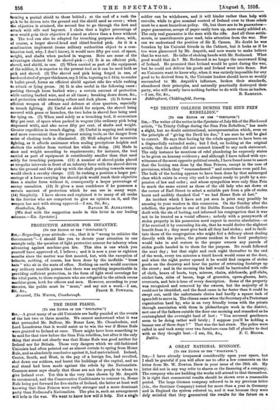"IN TRINITY COLLEGE DURING THE SINN FEIN REBELLION."
[To THE EDITOR OP TEl " SPECTATOR.1 Sat,—The writer of the notice in the Spectator of July 8th of the Blackwood article, " In Trinity College during the Sinn Feb Rebellion," has made a slight, but no doubt unintentional, misrepresentation which, even on the principle of " giving the Devil his due," I am sure he will be glad to correct. He says that looting by the rebels appears to have been on a disgracefully extended scale ; but I find, on looking at the original article, that its author did not commit himself to any such statement. The only instance he mentions of rebel plundering ho expressly states to be given on hearsay evidence ; and although I have talked with eye- witnesses of the most opposite political creeds, I have found none to assert that the looting was done by the Sinn Feiners, except in the case of provisions, which they " commandeered " and sometimes even paid for. The bulk of the looting appears to have been done by that submerged class which exists in every city and is always ready to profit by a sus- pension of law and order ; and whose sympathies were only Sinn Fein to much the same extent as those of the old lady who sat down at the corner of Earl Street to select a suitable pair from a pile of stolen boots and audibly thanked God " we had Home Rule at last."
An incident which I have not yet seen in print may possibly be amusing to your readers in this connexion. On the Sunday after the rebellion, the preacher in one of the Dublin Roman Catholio churches dealt with the sin of looting, and informed his congregation that it was not to be treated as a venial offence ; nobody with a pennyworth of stolen property in his possession need expect to receive absolution—or if he received it by concealing his sin, that he would derive the slightest benefit from it ; they must give back all they had stolen ; and to facili- tate those of the congregation who might feel a delicacy about dealing directly with the police, the priests resident in the local presbytery would take in and restore to the proper owners any parcels of stolen goods handed in to them for the purpose. No result followed the next day ; but that night and each night thereafter to the end of the week, every ten minutes a timid knock would come at the door, and when the night porter opened it he would find cargoes of stolen goods on the doorstep and hear the patter of retreating footsteps up the street ; and in the morning the hall would be barricaded with rolls of cloth, boxes of boots, toys, mirrors, chairs, sideboards, golf-clubs, cricket-bats, sides of bacon, bags of groceries, opera-glasses, hats, overcoats, and bric-h-brao of every description. Some of the property was recognized and removed by the owners, but the majority of it could not be identified, and the flood came in far faster than it could be swept out, until the unfortunate clerics had hardly a square inch of space left to move in. The climax came when the Secretary of a Protestant organization hard by, who is on very friendly terms with the priests through association with them in philanthropic work in the district, met one of the fathers outside the door ono morning and remarked as ho contemplated the overnight haul of loot : " You reverend gentlemen seem to be doing rather well lately ; I suppose you'll be holding a bazaar one of these days ? " That was the last straw. The police were called in and took away over two furniture-vans full of plunder to deal with as they thought best.—I am, Sir, &c., F. C. MOORE. Dublin.






























 Previous page
Previous page